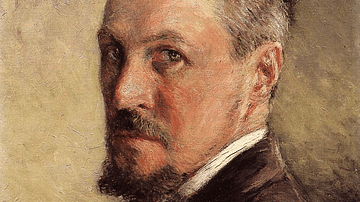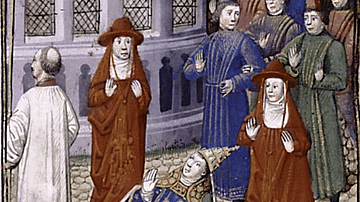Search Definitions
Browse Content (p. 78)

Definition
Great Fear
The Great Fear (French: la Grande Peur) was a wave of panic that swept the French countryside in late July and early August 1789. Fearful of plots by aristocrats to undermine the budding French Revolution (1789-1799), peasants and townspeople...

Definition
Taifa
Taifas ("factions" or "camps") were small independent Muslim kingdoms and principalities that emerged after the fall of hegemonic Muslim caliphates in al-Andalus – the Muslim-controlled part of the Iberian peninsula – during the High Middle...

Definition
Gustave Caillebotte
Gustave Caillebotte (1848-1894) was a French impressionist painter noted for his draughtsmanship and flair for capturing perspective. He was particularly fond of scenes showing people at balconies and admiring views, often with a rigorous...

Definition
Persian Rose-and-Nightingale Paintings
Rose-and-nightingale paintings and patterns (gul-u-bulbul) are a subtheme of the bird-flower (gul-u-morḡ) genre in Persian art. Bird-and-flower paintings are of Chinese origin and include pictorial elements such as flowers and plants, birds...

Definition
Crucifixion
Crucifixion as a punishment was practiced by several ancient cultures, but most notably adopted by the Roman Republic and later Roman Empire. Crucifixion was a method of hanging or suspending someone on the combination of vertical and horizontal...

Definition
Pierre-Auguste Renoir
Pierre-Auguste Renoir (1841-1919) was a French impressionist painter. Capable of painting in many different styles, even in the same painting, Renoir was certainly prolific, creating over 6,000 paintings in a long career. He had a preference...

Definition
Paul Gauguin
Eugène Henri Paul Gauguin (1848-1903) was a French neo-impressionist painter whose vivid paintings with their flat, bold colours and use of mystical and ambiguous symbols revolutionised art. Never quite gaining success in his own lifetime...

Definition
French Wars of Religion
The French Wars of Religion (1562-1598) were a series of eight conflicts between Protestant and Catholic factions in France lasting 36 years and concluding with the Protestant King Henry IV of France (r. 1589-1610) converting to Catholicism...

Definition
Jeanne d'Albret
Jeanne d’Albret (Joan III of Navarre, l. 1528-1572) was Queen of Navarre, daughter of Marguerite de Navarre (l. 1492-1549) and niece of King Francois I (Francis I of France, r. 1515-1547). She is best known for leading the Huguenots (French...

Definition
Pope Joan
Pope Joan was a legendary female pope of the Middle Ages said to have reigned from 855 to 858. After her story was popularized by Italian writer Giovanni Boccaccio (1313-1375), a statue of her was placed alongside those of other popes at...